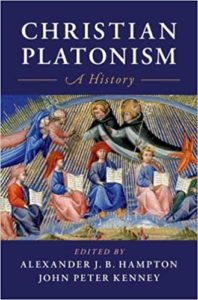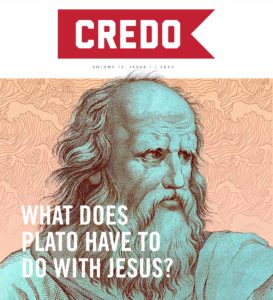Anyone wishing to understand the Christian tradition deeply must consider the central, formative role of Platonism. At various times Platonism has constituted an essential philosophical and theological resource, furnishing Christianity with a fundamental intellectual framework that has played a key role in its early development, and in subsequent periods of renewal. Alternately, at other times, it has been considered a compromising influence, conflicting with the faith’s revelatory foundations and distorting its inherent message. In both the positive and negative cases, the central importance of Platonism, as a force which Christianity defined itself by and against, is clear. Equally, this process of influence is not unidirectional. Whereas Platonism played a key role in the development of Christianity, the further development of Platonism beyond antiquity was dependent to a large degree upon Christian thinkers. The importance of this dialogue provides an answer to Tertullian’s celebrated question: ‘What has Athens to do with Jerusalem?’ The emphatic answer, detailed in the chapters of Christian Platonism: A History, is everything.*
Matthew Barrett, executive editor of Credo Magazine, sat down with John Peter Kenney, Professor Emeritus of Religious Studies at Saint Michael’s College, to discuss the implications of Christian Platonism for Christians today.
Y ou have been immersed in Christian Platonism for decades now. In recent years a renewed interest in Christian Platonism has emerged, especially as theologians consider its usefulness for developing a sophisticated metaphysic that recovers divine transcendence over against modernity and postmodernity. Why do you think there is a surge of interest in Christian Platonism?
ou have been immersed in Christian Platonism for decades now. In recent years a renewed interest in Christian Platonism has emerged, especially as theologians consider its usefulness for developing a sophisticated metaphysic that recovers divine transcendence over against modernity and postmodernity. Why do you think there is a surge of interest in Christian Platonism?
Scholars have used the term Christian Platonism to draw attention to the various ways in which Christian theologians have appropriated and revised aspects of Platonic philosophy down through the centuries. I think it is a good idea not to get too hung up on the term itself. It just points out how Platonism has been important for the development of Christian thought.
Today there is renewed interest in Platonism among Christian theologians who are concerned to push back against the leveling force of contemporary materialism or physicalism, the doctrine that only matter and physical processes are real. In the history of Western philosophy Platonism has been the preeminent conceptual opponent of materialism. It has also been a strong proponent of divine transcendence or immateriality, that is, the belief in an ultimate first principle existing independently of space, time, and the physical universe. Moreover, ancient Platonism considered nature to be alive and sustained by a World Soul, and it therefore rejected mechanistic accounts of the physical world. This theme has caught the attention of contemporary theologians concerned with ecology and a revaluation of the natural world. At Cambridge, there is now a Center for the Study of Platonism in the Faculty of Divinity, founded by Professor Douglas Hedley. It is worth noting that two of the leading Christian ecclesiastical figures in recent years are distinguished Augustine scholars: Rowan Williams, the former Archbishop of Canterbury, and Pope Benedict XVI.
For those readers still unfamiliar, how should “Platonism” be defined, especially in view of philosophers like Plato and Aristotle?
There are two things to keep in mind about ancient Platonism.
First, we need to remember that philosophy in antiquity was meant to be a way of life, and not just an academic discipline. Platonists pursued the “love of wisdom” by following a life modeled on Plato’s account of Socrates, a life centered not on worldly success but on the quest for wisdom. To be a Platonic philosopher meant adopting an austere ethical life in conjunction with the practice of dialectic, based on ideas drawn from the dialogues and the teachings of Plato. In antiquity, Platonism denoted a distinctive group that met at the Academy in Athens, and later expanded to other cities. For this reason, early Christians did not think of themselves as Platonists; indeed, they were regarded as members of a distinctive school with its own teachings and practices, even if they adopted and revised some important concepts from the Platonists.Philosophy in antiquity was meant to be a way of life, and not just an academic discipline. Click To Tweet
Second, although the interpretation of Plato’s teaching varied among the pagan Platonic schools, there was a rough coalescence that emerged by the beginning of the Christian era. Platonists were committed to what might be called transcendentalism, that is, belief in the existence of an immaterial level of reality that is more real than the ever-changing physical realm of space and time. The changing material world emerged from immaterial reality and is preserved in existence by participating in the eternal and stable properties that exist at that higher plane of being. Those were described as paradigms or forms, such as justice, beauty, etc. That higher realm was understood to be hierarchically ordered, and at its apex was the form of the Good itself, which was said by Plato in the Republic to be “beyond intellect and being.”
Platonists came to regard the Good as the ultimate deity, from which lower levels of reality and divinity emerged. They commonly taught that a second god came forth from the ultimate Good, an active cosmic power through whom all lower realities were made. A primordial principle of disorder was also part of this Platonist cosmology until late antiquity, providing the material substrate that the active divine craftsman molded to produce the cosmos. Finally, Platonists taught that the human soul had the capacity to draw itself up to that higher transcendent level of reality through the practice of philosophy. Platonists believed in different versions of reincarnation, but the common goal was to be freed from repeated incarnations and to exist eternally in that perfect world. Thus, pagan Platonism might be said to have offered salvation through philosophy, and thereby took on aspects of what we would describe as a religion.
You make a fascinating point: although we use a phrase like “Neo-Platonism,” recent research has shown that Platonism was not so divided as some have assumed. How does Platonism develop rather than diverge with someone like Plotinus?
Throughout antiquity the pagan philosophers who followed Plato simply called themselves “Platonists,” and they held varying views on the exact interpretation of his teachings. “Neoplatonism” is a somewhat pejorative term that Eighteenth Century German scholars invented to distinguish between what they regarded as the authentic philosophical teachings of Plato and the more theologically inclined doctrines found among Platonists in late antiquity.
Plotinus (205-270 A.D.), an Egyptian who studied in the Alexandrian Platonic school and who later opened his own school in Rome, is the key figure. He considered himself to be drawing out what was conceptually implicit in Plato. Plotinus was widely regarded as the preeminent philosopher of late antiquity, a creative genius who developed a systematic form of pagan monotheism, centered on the Good or the One. Augustine greatly esteemed him, pointing out how highly he was praised for understanding Plato better than anyone.Platonists were committed to transcendentalism, the belief in an immaterial level of reality that is more real than the ever-changing physical realm of space and time. Click To Tweet
Plotinus taught that the One is the infinite source of all reality, introducing a positive understanding of infinity into theology. Because the One is infinite, it transcends all forms of finite reality and conceptual attribution. But because the One is infinite, it also saturates all forms of finite reality with its omnipresence. To exist is to be in the presence of the One. In antiquity Plotinus was seen as the great pagan “holy man,” someone whose soul had achieved union with the One through the practice of philosophy. He was therefore both a philosophical and a religious figure. Scholars today are increasingly inclined to agree that Plotinus’ innovations can be plausibly understood as developments from Plato’s thought, and so the term “Neoplatonism” is increasingly avoided.
The integration of Platonism and Christianity might feel like compromise to some, but many of the church fathers believed a “Christian” Platonism was not only possible but advantageous. Can you tell us why?
Christian Platonism began with Jewish Platonism, with the appropriation of elements of Platonic thought within Hellenistic Judaism. It is important to recognize that Jews in the period of Christ were immersed in Hellenistic culture across the Mediterranean world. They translated the Hebrew Bible into Greek – the Septuagint – and included additional works composed in Greek, such as the Wisdom of Solomon, which was significantly influenced by Platonism.
The great Jewish Biblical exegete and philosopher Philo of Alexandria, a contemporary of St. Paul, was deeply indebted to Platonism. The theological discourse of early Christianity was influenced by Greek thought through Hellenistic Judaism and the adoption of elements from Platonism was a natural part of this development, as early Christian thinkers drew on ideas that were already present in Jewish theology. So, the connection of Platonism and Christianity was not a compromise but the result of a natural process of conceptual transmission.
What Platonism provided to both Hellenistic Jews and Christians was a notion of spiritual transcendence by which they could articulate their own versions of monotheism. If you no longer believe that God exists in space and time, but on an eternal and immaterial plane of reality, then the way you conceive of God fundamentally changes. God is, as it were, no longer out there somewhere beyond the heavens. As a result, the vector of spirituality shifts from contacting a far-off God through sacrifice or angels to finding God present to the soul and discoverable through contemplation of his revealed word.
Paradoxically, the concept of spiritual transcendence intensified the notion of divine immanence. And so Christianity developed its own novel theology, centered on a God who emptied himself of his immaterial existence and entered space, time, and materiality through incarnation. This was a total departure from pagan Platonism, even if it employed its key conception of immateriality.
Perhaps some patristic examples can be enlightening. How did Justin Martyr appropriate Platonism to advance his Christian apologetic?
Justin Martyr was the first Christian philosopher, born around 100 A.D. In his Dialogue with Trypho the Jew he tells the story of his studies with Stoic, Aristotelian, Pythagorean, and Platonist philosophers. Platonism had a powerful influence on him, specifically its teaching of immaterial reality and its doctrine of contemplation. Here is how he described its impact:
“And the thought of immaterial things seized me, and the contemplation of the forms gave wings to my understanding, so that in a short time I saw myself as having become wise, and as a result of this stupidity, I expected immediately to behold God. For that is the goal of Plato’s philosophy.”
You can see here how Justin has grasped the Platonic notion of transcendence, while also recognizing its overestimation of the power of the human soul. This is a recurrent theme among ancient Christians: that the Platonic account of immaterial reality is correct but inadequate for a complete knowledge of God and the soul’s salvation. True wisdom and salvation must be found in divine revelation, whose prophecies culminated in the incarnation of Christ.Justin Martyr grasped the Platonic notion of transcendence, while also recognizing its overestimation of the power of the human soul. Click To Tweet
Augustine may be the most famous representative of Christian Platonism. How did Platonism and its transcendentalist hermeneutic serve as an antidote to materialism, even open Augustine’s eyes to the credibility of Christianity?
Augustine’s story is surprising when you look at it closely. As a child and adolescent, he was introduced to Christianity in his native North Africa but never baptized. In late adolescence he became a Manichaean Christian, one of the followers of Mani, the Persian “apostle of Jesus Christ.” The Manichees styled themselves as more sophisticated than orthodox Christians, rejecting the Old Testament and regarding Jesus as a pure being of light who never took on human flesh and never died. Their teaching was a materialistic dualism, positing two opposite physical energies – Goodness/Light and Evil/Darkness – engaged in a cosmic struggle. They regarded their materialism as scientific in character, a merger of theology with physics. Augustine insists in his Confessions that if he had grasped the Platonist understanding of immateriality, he would never have remained a Manichee. But until his early 30’s, when he read “some books of the Platonists” on the recommendation of Catholics in the circle of Ambrose, the bishop of Milan, he had no notion of “immaterial truth.” It was only then that he could embrace orthodoxy.
Augustine believed Platonism provided him with the framework for understanding Christianity and its spirituality, but he did not think Platonism could take him all the way there. Why did Augustine think Christ was necessary for this transcendent journey? And do you think Christ is the one who makes Augustine’s Platonism “Christian” in the end?
In the Confessions, Augustine spooled the story of his life around the core of his newly found Christian theology. It is an account of someone who had lost his way spiritually while becoming a worldly success. Along the way he had rejected his father’s paganism and his mother’s Christianity, become a Manichee for over a decade, lapsed into skepticism, and finally rediscovered Christianity in the intellectually sophisticated version of Ambrose. Yet he tells us that it was Christ who had been calling him all along, even leading him to read pagan Platonism before studying the scriptures so that he could now see their deeper meanings. And his long spiritual trajectory came to an end because Christ, the divine Wisdom, lifted his soul into communion with him in a moment out of time, a coming into the eternal presence of true being itself. Now Augustine was ready to encounter the scriptures, and when he reads Romans 13: 13-14, he is filled with the grace of conviction. As he says, “all the shadows of doubt were dispelled.” He commits himself not just to Nicene orthodoxy but to an ascetical life in imitation of the earthly life of Jesus. He gave up his career, his wealth, his aristocratic marriage, and returned to North Africa to live in monastic seclusion.
He tells his readers that this conversion of life was not the result of his own efforts but was accomplished through the power of Christ. This recognition became a central component of his theology: that the human soul is too fallen to restore its connection to God without divine intervention. A recurrent image in his writings is of a person on a journey who looks out from the summit of a hill. In the far distance he can catch a glimpse of the homeland he seeks. Yet the valley below is a full of obstacles and armed fugitives. Platonists have a vision of the homeland and believe they can make it across that dangerous valley on their own. That is a false and prideful judgment. In contrast, Christians humbly realize their need for “the protection of the heavenly emperor” in order to reach their homeland. Augustine thought that his own life proved this to be true.
How did Platonism move Augustine beyond a literalistic exegesis of scripture to understand its deeper spiritual truths?
When Augustine was a Manichee, he criticized orthodox Christians for their literal reading of scripture, especially what he believed to be their absurd anthropomorphic conception of God. He says that he used to “bark” at them, thinking their claim that humans are made in the image of God meant that God had a human body. In those days he says he didn’t have even an obscure suspicion of the existence of “spiritual substance.” But the sermons of Bishop Ambrose disabused him of those false notions, carefully explaining the principle of exegesis that “the letter kills, the spirit gives life” (2 Cor. 3: 6). When he then grasped the idea of spiritual or immaterial existence from reading Platonism, then everything fell into place. He now understood the metaphysics behind the exegesis of Ambrose. When Augustine grasped the idea of spiritual or immaterial existence from reading Platonism, then everything fell into place. Click To Tweet
It should be pointed out that Ambrose used Philo’s writings so extensively that he has been called the “Christian Philo.” This underscores the point made earlier about the transmission of Platonic thought through ancient Judaism into early Christianity. It is also important to recognize that for Augustine what was at issue was not just methods of exegesis. Discerning the spiritual dimension of scripture drew the soul closer to Christ and invested the soul with the power of his grace. The goal was not to know about Christ through reading the scriptures, it was for the soul to “adhere” to Christ. As he says, his desire was not to be more certain about God, but to be more stable in Christ.
Some will say that Platonism corrupted Christianity. It is ironic when evangelicals make this claim because it is one that was made originally by Adolf von Harnack and other advocates of Protestant liberalism. In response, why do you think Christian Platonism is not a compromise of Christianity but a fundamental template that establishes divine transcendence, marks a gateway to authentic spirituality, and even serves as a path that prepares the way for Christ?
Yes, there is an ironic conjunction here. The problem is that this “corruption narrative” stems from an historically flawed model which sharply separates Judaism from Hellenism. But this model collapsed by the middle of the 20th century as scholars came to recognize the complex relationship between Hellenism and both Judaism and early Christianity.
Another contemporary irony is that some of the people who see Platonism as a corruption of Christianity are also big fans of C. S. Lewis. But Lewis has often been described as a Christian Platonist. It is quite evident that Plato was a major philosophical influence on him, and he was an expert on the influence of Platonism on medieval and Renaissance literature. Part of the enduring appeal of his work is his ability to describe the enchantment of an immaterial world shining like “patches of Godlight” into our earthly lives.
There is a final historical irony worth noticing. The increasingly widespread acceptance of divine immateriality in late antiquity helped to promote a gradual shift to monotheism. Augustine praises the Platonists for their pagan monotheism and their teaching that the soul can attain true happiness only when it adheres “to that unique and supreme Good, which is the changeless God.” At the same time, however, he attacks pagan Platonists for their continuing cultic devotion to the traditional gods. But in the end, it was Nicene Christianity that became the preeminent form of monotheism, not pagan Platonism.



